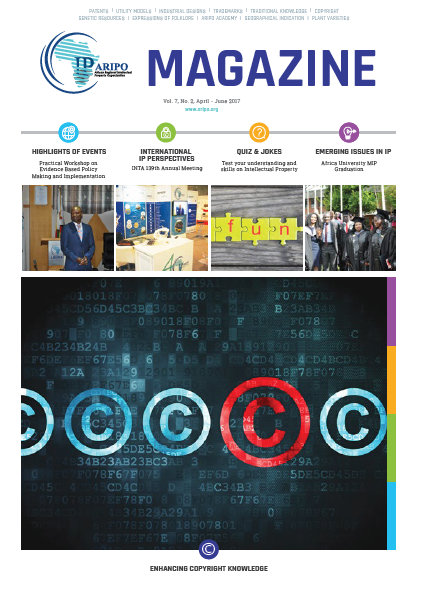
‘In as much as some people might hold the view that copyright is the least important of intellectual property assets [sic], creative industries are at the heart of our economies’ – Tariro Anifasi, ARIPO.
During the 25th Administrative Council Session held in Accra, Ghana in November 2001 the Republic of Malawi made a proposal to extend the mandate of African Regional Intellectual Property Organization (ARIPO) to include Copyright and Related Rights to enable ARIPO coordinate copyright and related rights at regional level. ARIPO has since taken steps to implement the mandate through policy development, capacity building and advocacy. The latest effort by ARIPO was in June 2017 when it co-organised and hosted a symposium on copyright and related rights with the theme “Shaping the Copyright and Related Rights System in Africa”. The symposium brought together copyright offices, collective management organizations (CMOs) in ARIPO Member States and entrepreneurs together to discuss topical issues facing copyright and related rights administration and the role of ARIPO in shaping the copyright system.
Prior to the symposium, ARIPO signed a landmark Memorandum of Understanding (MoU) with International Federation of the Phonographic Industry (IFPI). According to ARIPO, ‘the vision behind that MoU was to strengthen the copyright law framework and licensing of recording rights across the African continent.’ This MoU represents strong commitment from ARIPO to advance development and utilisation of the copyright system on the continent. This MoU was preceded by an earlier agreement between ARIPO and CISAC. According to ARIPO, ‘both organizations seek to unite in projects that strengthen copyright, technical exchange, education and more so training of organizations that collect revenues for creators of copyright and related rights.’
A key strategic area that ARIPO has identified in the area of copyright and related rights is collective management. According to ARIPO, ‘for creators to blossom into their full potential, it is vital that CMOs be provided with the requisite support to nature (sic) creators and contribute to social-economic booms.’ Another interesting area that ARIPO has ventured into is the establishment of a voluntary copyright registration and notification system.
In this regard, ARIPO recently commissioned a feasibility study and development of Policy Framework for the Voluntary Registration and Notification System to be completed by end of 2017. The feasibility study was aimed at establishing the technical, economic and financial, institutional and managerial, environmental and socio-cultural, and operational aspects of the System at ARIPO. It was proposed that this study would be done in six countries, namely: Ghana, the Gambia, Malawi, Namibia, Kenya and Zambia.
Some of the issues considered in the study included: the nature, number and type of beneficiaries and other stakeholders that the Voluntary Copyright Registration & Notification System of ARIPO will potentially affect; All Member states, organisations and agencies impacted on by or involved in the Voluntary Copyright Registration & Notification System of ARIPO; All major problems experienced by the supposed beneficiaries and by any other parties likely to be involved, the causal interrelationships of these problems, and the inter-sectoral links; Other interventions or priorities by any Member State, national organization or donor which may be affected by the Voluntary Copyright Registration & Notification System of ARIPO; Appropriate technology, technical matters and technical assistance; Institutional and management capacity and arrangements, public and private; Economic and financial aspects. Following the study, a draft policy framework would be developed for consideration by the governing bodies of ARIPO.
The image at the header of this blogpost is the latest (and only) publication of the ARIPO Magazine in the year 2017. The theme of the Magazine is “Enhancing Copyright Knowledge”, which is very apt in an environment where most creators and innovators are more likely to be familiar with ARIPO for its well established industrial property mandate. It is laudable that ARIPO continues to demonstrate its commitment to copyright and related rights in Africa.